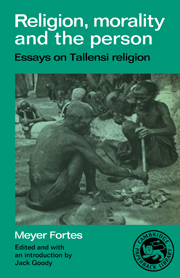Book contents
- Frontmatter
- Contents
- List of figures
- Introduction by Jack Goody
- 1 Divination: religious premisses and logical techniques
- 2 Prayer
- 3 Ritual festivals and the ancestors
- 4 Ancestor worship in Africa
- 5 Ritual and office
- 6 Totem and taboo
- 7 Coping with destiny
- 8 Custom and conscience
- 9 The first born
- 10 The concept of the person
- Endpiece: sacrifice among theologians and anthropologists
- Notes
- References
- Index
- Frontmatter
- Contents
- List of figures
- Introduction by Jack Goody
- 1 Divination: religious premisses and logical techniques
- 2 Prayer
- 3 Ritual festivals and the ancestors
- 4 Ancestor worship in Africa
- 5 Ritual and office
- 6 Totem and taboo
- 7 Coping with destiny
- 8 Custom and conscience
- 9 The first born
- 10 The concept of the person
- Endpiece: sacrifice among theologians and anthropologists
- Notes
- References
- Index
Summary
This topic may appear orthodox to a degree at a time when our studies are reverberating with new words and new ideas. My excuseis that I did not choose it; it forced itself on me. Let me explain. In the heyday of functionalism, one of our preoccupations was to assert the autonomy of social anthropology as a discipline in its own right. When Malinowski proclaimed himself to be at heart an antiquarian (1932: xxv) his tongue was not merely in his cheek but protruding provocatively in the direction of the searchers after pristine savagery. More soberly, as he put it in his posthumous manifesto for an independent science of culture, ‘our minimum definition implies that the first task of each science is to recognise its legitimate subject matter’ (1944: 14) By the same token Radcliffe-Brown went to special pains, in 1931, to dissociate the ‘generalising science of culture and society’ from human biology, prehistoric archaeology and historical ethnology (1931). And it is, incidentally, very pertinent to my topic that, in order to illustrate the ‘newer social anthropology’, he outlined his functionalist theory of totemism. In the middle thirties the claim that ‘anthropology deals with mankind as a whole’ (Boas 1938: 1) was still authoritatively asserted by such eminences as Boas and Seligman. Nor must it be thought that this conception had support only from the diehards (cf. Beattie 1964). The case for ‘an integrative framework for the study of human groups …’ was learnedly argued by one of my predecessors in this office, Professor Daryll Forde (1951).
- Type
- Chapter
- Information
- Religion, Morality and the PersonEssays on Tallensi Religion, pp. 110 - 144Publisher: Cambridge University PressPrint publication year: 1987
- 1
- Cited by



